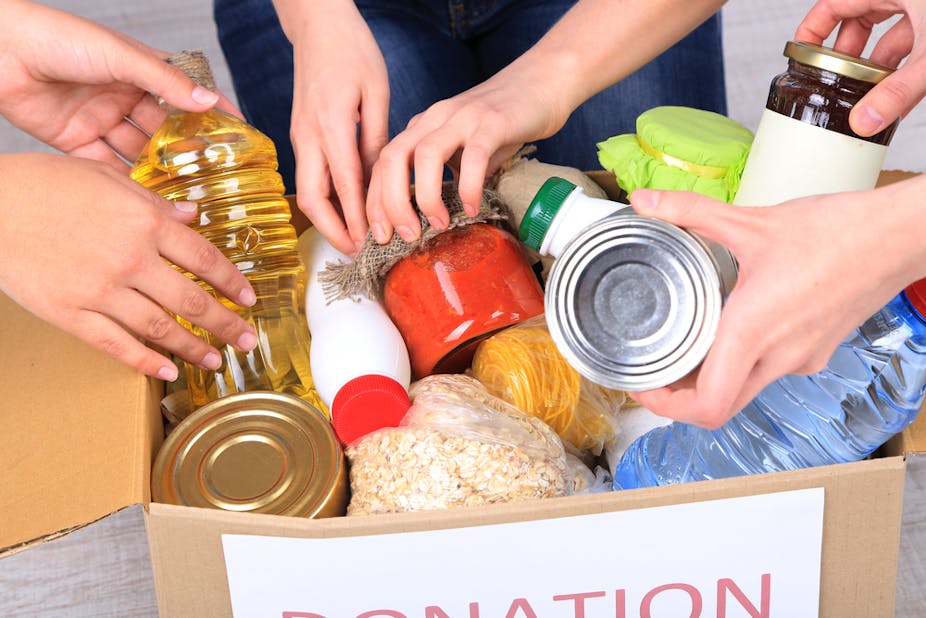On May 8 2015 I awoke to discover that not only were we not looking forward to a new coalition government in the UK, but that the overall collapse of the Liberal Democrats and the Labour Party had given the Conservative government a mandate. At an individual level I’m likely to see some benefits from the strong neo-liberalism that underpins this government’s ideology, but I’m concerned about a further deepening of the division between those who have and those who have not.
This will mean the continued exponential growth in the numbers of people requiring emergency food assistance and increased numbers of children and elderly with inadequate food supply. This will also translate into higher rates of obesity, diet-related illness and malnutrition.
The most vulnerable
In the United Kingdom there are nearly 5m people today living as food insecure. Wendy Wills, an expert in food and public health, defines this as those who are unable to acquire or consume an adequate quality or sufficient quantity of food made available in socially acceptable ways, or who have the (regular) uncertainty that they will be able to do so.
In 2014, more than 20m meals were provided to people unable to provide for themselves. Since 2010 there has been an exponential growth in the number of households relying on emergency food aid. In 2009-10 nearly 50,000 households received three days of emergency food aid but by 2014-15 the number had increased to more than a million. Oxfam UK has estimated that: “36% of the UK population are just one heating bill or broken washing machine away from hardship”.
Poor distribution
Looking at these figures one might think the UK is not a wealthy nation. But this is not the case. Credit Suisse put the UK fifth in a ranking of nations by wealth, behind the US, Japan, China, and France. Based on 2010 UK Census figures, per capita wealth in the UK is about US$182,825, but this wealth is not distributed evenly across the population. While the wealthiest fifth of the population controls nearly 41% of the income, the poorest fifth have just 8%. And while rates of employment have increased over the last few years, pay growth has not kept up.

Libraries and parks may come under further fire. Save Doncaster Libraries, CC BY
The new government has little in its manifesto to indicate relief, instead there are promises to cut public spending by a further £55bn by 2019 (on top of the £35bn cut during the coalition government). We have already seen cuts in work programmes that support those with disabilities in their first week in office. In the firing line are Sure Start programmes and programmes for refugees and migrants while reduced funding for local authorities will mean not only cuts to programmes that support the most vulnerable but also cuts to other services providing things such as road repairs, parks and libraries.
On top of the loss of services and support programmes, cuts also translate into bodies out of employment. So this new round of austerity will reach higher up the ladder for those living in the UK because a large proportion of the costs associated with these services is the wages for those who deliver them. The Office for Budget Responsibility indicates that by 2020 there will be a further loss of a million government jobs (compared to the loss of 400,000 government jobs over the course of the last parliament). One can only conclude that income inequality will widen, a state that already has one of the highest divisions between wealthy and poor in Europe (only lower than Turkey and Portugal in 2010).
Disposable income
For those living in poverty in the UK today the amount of disposable income for the poorest fifth of households is about £156 per week. This is income after taxes and transfer payments and includes spending on clothing, getting to work, childcare, keeping warm, washing, communicating with others, paying for housing, celebrating birthdays, holidays, paying for school trips, uniforms and supplies, socialising and cooking (including not just the food but also the fuel to run the cooker, microwave, and refrigerator).
For many households (not just the poorest), the most flexible item in their budget is food expenditure. Families in this position are not concerned with the environmental or social implications associated with the food that they buy, but instead concentrate on “getting fed”. Because it is now less expensive to feed ones family on processed food (with higher salt, sugar, and fat content) than fresh food and as the cost of food is predicted to continue to rise, we can expect to see not just increases in the numbers of people going hungry and relying on emergency food aid, but also increases in the rates of dietary-related illnesses such as obesity, diabetes and malnutrition. These health implications will, in turn, continue to place greater pressure on an already-struggling NHS.
Obligations made
The government has an obligation to ensure that the right for all human beings to be free from hunger, food insecurity and malnutrition, as specified in a UN covenant to which the UK is a signatory, is upheld. The UK is also a signatory to the UN Convention on the Rights of the Child, which specifies a duty to provide “material assistance and support programmes, particularly with regard to nutrition.”
At present the rolling back of social services, the decline in real wages, increases in food costs coupled with an emphasis within the Conservative manifesto to develop food production in this country as an export (as opposed to subsidising it in order to feed the nation), suggests that this obligation is not one that is being taken seriously.
If we cannot look to our national government to uphold these rights and obligations, it seems that there is no recourse but to fill the gap from within, something the Conservatives are banking on. In their manifesto, the only mention of food justice is expressed via the following phrase:
We have always believed that churches, faith groups and other voluntary groups play an important and longstanding role in this country’s social fabric, running food banks, helping the homeless and tackling debt and addictions, such as alcoholism and gambling. In the short term it is evident that the public will need to rely on each other to support the most vulnerable, which includes the elderly and children.
Food banks are not a long term solution. Birmingham News Room, CC BY
Food banks and charity are not a long-term solution, nor are they an adequate solution. We know that food banks are an insecure form of support as they rely on gifts which can be withdrawn at any time. Their coverage is spatially uneven as they are more likely to be located in cities leaving the rural poor in a more precarious position. Donated food also tends to be non-perishable food, as opposed to fresh food free of E numbers, fat, salt, and sugar. Food banks also do not address more structural issues that give rise to food insecurity in the first instance. The Trussel Trust, which runs many food banks, does offer some ancillary support but this still focuses on individuals, not on the wider problems.
No single department is responsible
As a country we need a better understanding of the resources available to local authorities who bear the burden of addressing the inequalities associated with food and who must deliver services to the poor.
As citizens we also need to demand that the government meet its UN obligations to ensure the right to food and the rights of the child. This cannot happen within existing government departments as the focus of these rights is not embedded within any one single agency. We have the Food Standards Agency, but its remit doesn’t address food access. DEFRA’s focus is on food production and agriculture. The Department of Health’s focus is on nutrition outcomes rather than the root causes of obesity and the structure of food system in the UK. The Department for Work and Pensions similarly only considers those elements that are employment focused.
We currently have subsidies for winter fuel, transportation, and housing, but there is nothing that ensures food affordability. What is called for is a cross-cutting governmental body, with a minister for food, who ensures that policies enacted through these departments deliver access to sufficient, healthy, affordable, and culturally appropriate food for all of us, not just the wealthy.





